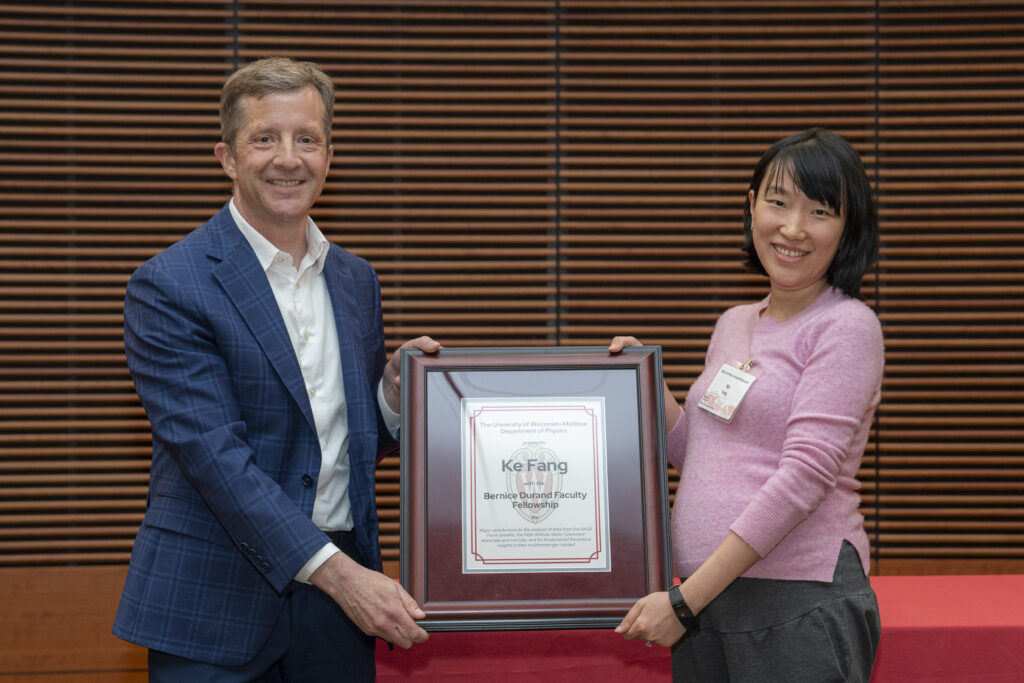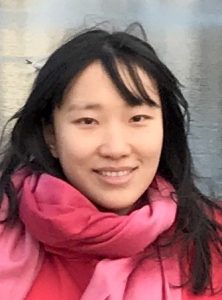Neutrinos are weakly interacting particles that are able to travel undeflected through the cosmos. The IceCube Neutrino Observatory and the KM3NeT Astroparticle Research with Cosmics in the Abyss (ARCA) telescope (still under construction) are cubic-kilometer-scale neutrino telescopes that search for the sources of these astrophysical neutrinos in hopes of uncovering the origin of ultra-high-energy cosmic [...]
Read the full article at: https://wipac.wisc.edu/probing-the-connection-between-the-highest-energy-astrophysical-neutrinos-and-ultra-high-energy-cosmic-rays/WIPAC
HAWC detection of an ultra-high-energy gamma-ray bubble around a microquasar
This story is adapted from the HAWC Collaboration press release. Microquasars—compact regions surrounding a black hole with a mass several times that of its companion star—have long been recognized as powerful particle accelerators within our galaxy. The enormous jets spewing out of microquasars are thought to play an important role in the production of galactic cosmic rays, although [...]
Read the full article at: https://wipac.wisc.edu/hawc-detection-of-an-ultra-high-energy-gamma-ray-bubble-around-a-microquasar/UW–Madison alum and theoretical physicist named WIPAC director
Dan Hooper, PhD, has been selected as the new director of the Wisconsin IceCube Particle Astrophysics Center (WIPAC). Hooper will begin his role at WIPAC on Sept. 9 and as director will report to the Vice Chancellor for Research. Hooper will have a joint faculty appointment with the Department of Physics. Hooper is a Senior […]
Read the full article at: https://research.wisc.edu/uncategorized/2024/07/26/uw-madison-alum-and-theoretical-physicist-named-wipac-director/WIPAC researchers set new limits on the origins of the Galactic neutrino emission detected by IceCube
Neutrinos are tiny, nearly massless particles that travel cosmological distances unhindered, acting as messengers that carry information about their sources. Since the recent detection of high-energy neutrino emission from the Milky Way, the IceCube Neutrino Observatory at the South Pole is working to pinpoint the exact nature of the Galactic emission contributing to the astrophysical [...]
Read the full article at: https://wipac.wisc.edu/wipac-researchers-set-new-limits-on-the-origins-of-the-galactic-neutrino-emission-detected-by-icecube/Ke Fang named inaugural recipient of the Bernice Durand Faculty Fellowship
The Department of Physics is pleased to announce that Ke Fang, assistant professor of physics and WIPAC investigator, has received the inaugural Bernice Durand Faculty Fellowship. This fellowship, given in honor of late Professor Emerit of Physics Bernice Durand, recognizes Fang’s major contributions to the analysis of data from the NASA Fermi satellite, the High Altitude Water Cherenkov (HAWC) telescope and IceCube, and for fundamental theoretical insights in their multimessenger context. Fang is a Sloan Fellow, has been awarded an NSF CAREER award, and is the spokesperson for the HAWC experiment.

Durand was one of the first two women professors in the UW–Madison Department of Physics. While at UW–Madison, Durand was a theoretical physicist who specialized in particle theory and mathematical physics. Her research was on symmetry relations in algebra and physics, plus the phenomenology of high-energy interactions at large particle accelerators.
As the first Associate Vice Chancellor for Diversity & Climate, Professor Durand provided leadership to ensure that faculty, staff, and student diversity issues including race, ethnicity, gender, sexual preference, and classroom and general campus workplace climate issues be addressed, and that search committees for non-classified staff be trained in broadening the pool of applicants and eliminating implicit bias. Durand co-directed a grant from the Alfred P. Sloan Foundation to the UW System designed to create more equity, flexibility and career options for faculty and academic staff. She was also a member of the leadership team of the Women in Science and Engineering Leadership Institute sponsored by the National Science Foundation to increase the participation and status of women in science.
A recipient of the Chancellor’s Award for Outstanding Teaching, Professor Durand taught courses at all levels, from modern physics for non-scientists (“Physics for Poets”) to a specialized course she developed for advanced graduate students in the use of topology and algebra in quantum field theory. In the mid 1990s, she used technological and pedagogical techniques in her teaching, such as broadcasting her modern physics for non-scientists course on public television with web-based coursework, and pioneering one of two early versions of MOOCs (massive open online courses) on campus.
Durand passed away in 2022.
The Bernice Durand Faculty Fellowship was conceived by our Board of Visitors, who spearheaded the ultimately-successful fundraising effort, with support from Professor Emerit Randy Durand for this fellowship honoring his wife.
UW–Madison physicist Francis Halzen elected to National Academy of Sciences
Halzen directs the UW–Madison Institute for Elementary Particle Physics Research and is the principal investigator of the IceCube Neutrino Observatory.
Read the full article at: https://news.wisc.edu/uw-madison-physicist-francis-halzen-elected-to-national-academy-of-sciences/Sanjib Kumar Agarwalla receives prestigious 2021-2022 Rajib Goyal Prize
Sanjib Kumar Agarwalla was recently awarded the 2021-2022 Rajib Goyal Prize in Physical Sciences, which “honors Indian scientists who have made a mark in basic and applied sciences research.” The Goyal Prizes were instituted by the late philanthropist Ram S. Goyal to honor Indian scientists and social activists working towards the service of India. Agarwalla [...]
Read the full article at: https://wipac.wisc.edu/sanjib-kumar-agarwalla-receives-prestigious-2021-2022-rajib-goyal-prize/WIPAC, UW–Madison Physics Department host after-school program
Last week, 23 participants and their family members gathered for an evening of presentations and cake as part of IceCube After School, an eight-week program hosted by the Wisconsin IceCube Particle Astrophysics Center (WIPAC). Since 2013, the annual program introduces local high school students to WIPAC research and the people who make it possible. For [...]
Read the full article at: https://wipac.wisc.edu/wipac-uw-madison-physics-department-host-after-school-program/Ke Fang named Sloan Fellow
This story is adapted from one published by University Communications

Ke Fang, assistant professor of Physics and WIPAC investigator, is among 126 scientists across the United States and Canada selected as Sloan Research Fellows.
The fellowships, awarded annually since 1955, honor exceptional scientists whose creativity, innovation and research accomplishments make them stand out as future leaders in their fields.
Using data from the Ice Cube Observatory and Fermi Large Area Telescope along with numerical simulations, Fang studies the origin of subatomic particles — like neutrinos — that reach Earth from across the universe.
“Sloan Research Fellowships are extraordinarily competitive awards involving the nominations of the most inventive and impactful early-career scientists across the U.S. and Canada,” says Adam F. Falk, president of the Alfred P. Sloan Foundation. “We look forward to seeing how fellows take leading roles shaping the research agenda within their respective fields.”
Founded in 1934, the Sloan Foundation is a not-for-profit institution dedicated to improving the welfare of all through the advancement of scientific knowledge.
Sloan Fellows are chosen in seven fields — chemistry, computer science, Earth system science, economics, mathematics, neuroscience and physics — based on nomination and consideration by fellow scientists. The 2024 cohort comes from 53 institutions and a field that included more than 1,000 nominees. Winners receive a two-year, $75,000 fellowship that can be used flexibly to advance their research.
Among current and former Sloan Fellows, 57 have won a Nobel Prize, 71 have been awarded the National Medal of Science, 17 have won the Fields Medal in mathematics and 23 have won the John Bates Clark Medal in economics.
Xiangyao Yu, assistant professor of computer sciences at UW–Madison, was also named a Sloan Fellow.
First field season for IceCube Upgrade ongoing at the South Pole
Over the past two months, a team of IceCube drill engineers have completed an impressive amount of work during the first of three consecutive field seasons for the IceCube Upgrade. The project is funded by the National Science Foundation and international collaborators.
The goal of the project is to drill seven holes in 2025/2026 and deploy seven more closely spaced and more densely instrumented strings of sensors in the central part of the array, which will improve IceCube’s sensitivity to low energies. Having a productive first field season both sets the Upgrade project up for success and trains the new generation of drillers at the South Pole.
The majority of the team’s engineers come from the University of Wisconsin–Madison’s Physical Sciences Laboratory (PSL), where equipment is fabricated and shipped to the South Pole. Additional drill engineers hail from Sweden, New Zealand, and for the first time, Thailand.
“This year’s drill team is a group of 17 talented professionals who have completed an enormous amount of work,” says Kurt Studt, drill engineer at PSL and the on-ice drill manager for the Upgrade. “We’ve overcome many difficult challenges while dealing with the extreme environment at the South Pole, including temperatures as low as -35 ⁰F and windchills below -60 ⁰F.”
